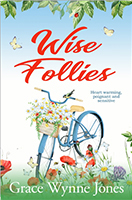Finding Your Own Writing Voice
If you’d sat me down after I wrote my first novel and asked me how I did it I wouldn’t have been able to give you cut and dried answers. What happened was a character called Jasmine came to me and pretty much insisted that I tell her story. She’d already made appearances in short stories that had been published or broadcast (including a short story slot on BBC Radio 4) to favourable feedback… though her name varied.
If all this sounds somewhat mysterious you’re right. It is. But I do know that Jasmine arrived in my life because, on some level, I felt ready to be more courageous with my writing. I wanted to share the details, warts and all, just like she did. If I summed it up in a sentence I would say I wanted to write the kind of book I longed to read. I have always loved books with highly intimate details that feel like friends. ‘Ordinary Miracles’ was informed by my own disappointments and questions and longings. It also contained a number of my bewilderments and my love of a good giggle. It seemed a case of ‘write what you know’ and ‘write what you want to know’. “I work on a picture and then it guides me” Fellini once remarked. The same can happen with a book.
I didn’t even think about publication and what others would make of it. I simply wanted it to feel true. Now, when I give writing workshops, I sometimes encourage participants to recall what it is like to listen to a song they love. How they are not just listening to it but somehow ‘in’ it too…aware of its shape, its tone, its ‘character’. They can know these same things about their own stories, but only if they are truly ‘in’ them as they are writing. To do this they need to bypass the inner critic who will have many opinions about every sentence. The inner critic is frightened that we may appear foolish, but is open to negotiation and can be an ally. I advise students to tell it can take “a nice break” during the first draft, but that it is very welcome to come and offer its expertise during editing.
Here’s a great quote:
‘There is only one trait that writers have in common….They watch for the extraordinary magic that lies in the everyday….Not willing inspiration but just being open to the world. This quiet looking and thinking is the imagination. It’s letting in ideas. It’s trying, I suppose, to make some sense of things.’ Joseph O’Connor
Warm wishes,
Grace










